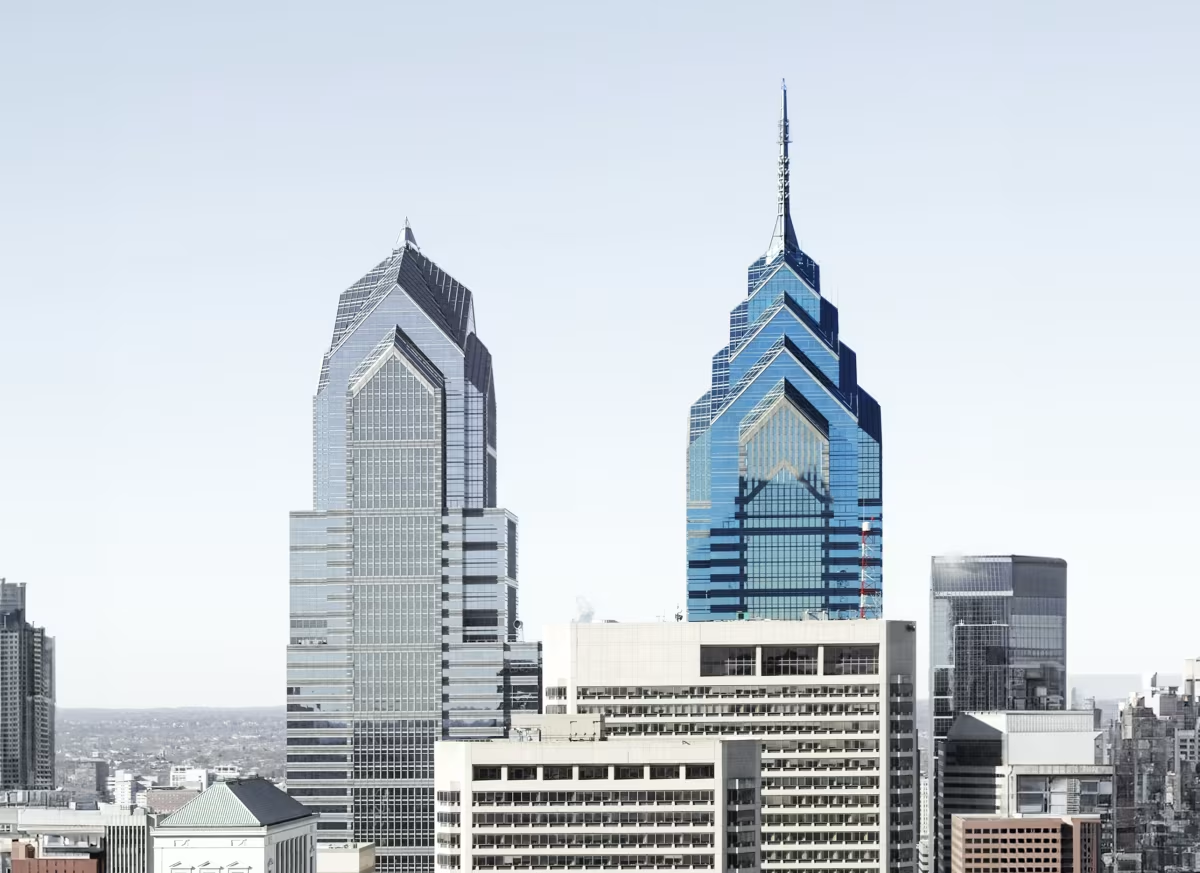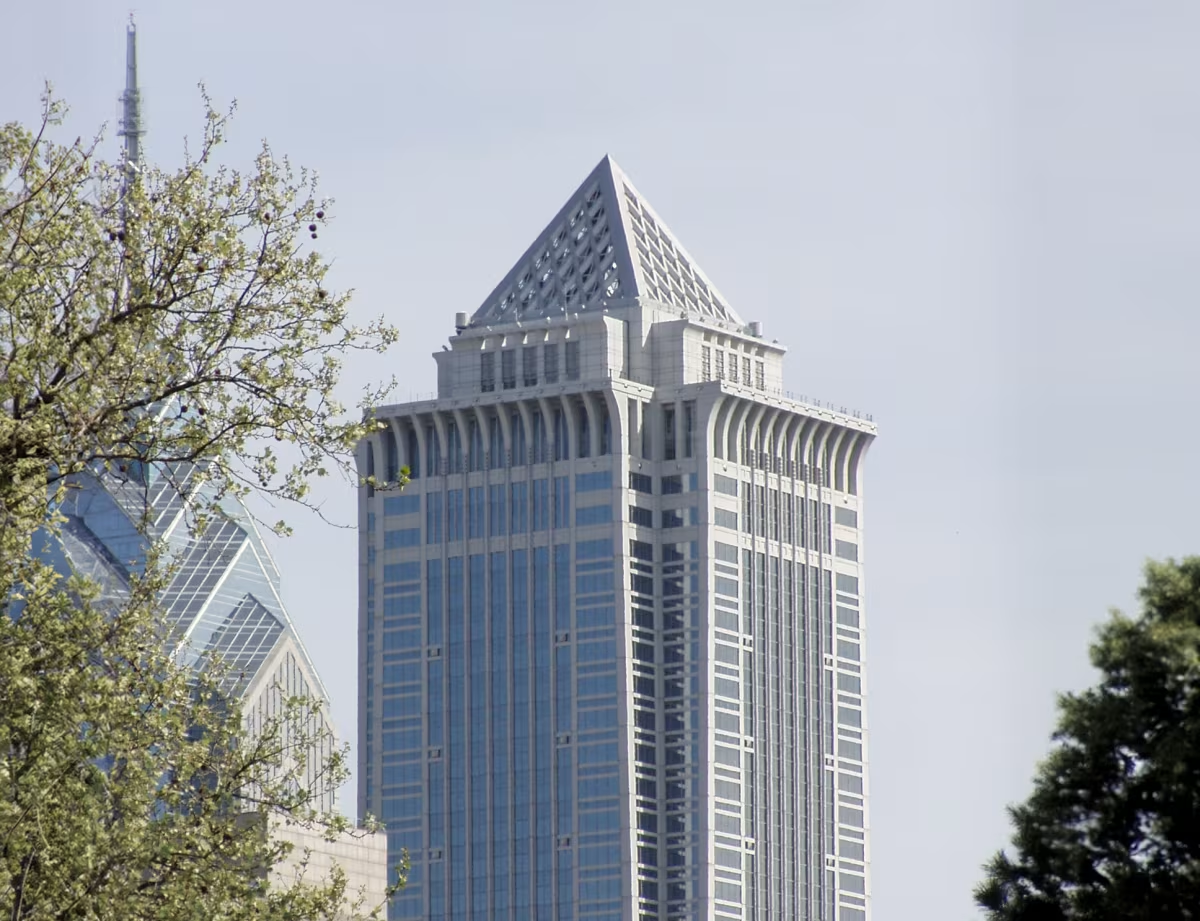One Liberty Place Building vs BNY Mellon Center Philadelphia Building


Comparing the One Liberty Place Building and the BNY Mellon Center Philadelphia Building is interesting because they both stand in Philadelphia, PA, and were completed within 3 years of each other, but they were designed by different architects.
This offers a unique glimpse at how rival designers approached projects in the same city during the same era.
Height & Size
These two towers present an interesting contrast in their proportions. The BNY Mellon Center Philadelphia Building rises higher at 791ft (241m), while the One Liberty Place Building reaches 0ft (m). However, the One Liberty Place Building accommodates more floors with 61 levels above ground, compared to 54 floors in the BNY Mellon Center Philadelphia Building.
This suggests different approaches to interior space design. The BNY Mellon Center Philadelphia Building has an average floor-to-floor height of approximately 4.5m, while the One Liberty Place Building has more compact floors averaging around 0m each. The taller building's more generous floor heights might indicate grander interior spaces, higher ceilings, or different programmatic requirements.
These different proportions likely reflect the specific needs each building was designed to serve, whether driven by zoning regulations, client requirements, or the intended use of the spaces within. The contrast shows how architects can achieve different spatial experiences even when working with similar overall building scales.
Architectural Style
Both the One Liberty Place Building and the BNY Mellon Center Philadelphia Building were designed in line with the aesthetic conventions of the Postmodernism style.
At the time, this style was at the height of its popularity. So both Murphy/Jahn Architects and Kohn Pedersen Fox Associates followed what was in many ways expected of them, producing designs that fit comfortably within contemporary architectural norms, rather than breaking with convention.
Uses
Both the One Liberty Place Building and the BNY Mellon Center Philadelphia Building were designed to serve as commercial towers, and that has remained their main use since their completion, serving similar roles in the urban fabric.
Both towers provide significant parking capacity, with One Liberty Place Building offering 779 spaces and the BNY Mellon Center Philadelphia Building offering 160.
Structure & Facade
The two towers rely on different structural systems, reflecting distinct engineering strategies.
The One Liberty Place Building uses a Framed Tube In Tube structural system, which combines a strong central core with a perimeter tube of columns, while the BNY Mellon Center Philadelphia Building uses a Frame system, that relies on a regular grid of columns and beams to sustain its weight.
Yet, when it comes to their facade, they both employed the same solution, a Curtain Wall facade.
A curtain wall is a non-load-bearing facade hung from the structural frame. It is anchored to floor slabs and transfers only its own weight and wind loads, allowing for sleek, glassy exteriors.
| One Liberty Place Building | BNY Mellon Center Philadelphia Building | |
|---|---|---|
| Murphy/Jahn Architects | Architect | Kohn Pedersen Fox Associates |
| 1984 | Design Started | 1986 |
| 1985 | Design Ended | 1987 |
| 1985 | Construction Started | 1988 |
| 1987 | Year Completed | 1990 |
| Postmodernism | Architectural Style | Postmodernism |
| Commercial | Current Use | Commercial |
| 61 | Floors Above Ground | 54 |
| 288 | Tip Height | 251 |
| 111,483 m² | Usable Area (m²) | 137,071 m² |
| Framed Tube In Tube | Structure Type | Frame |
| Steel | Vertical Structure Material | Steel And Concrete |
| Concrete | Horizontal Structure Material | Steel And Concrete |
| No | Facade Structural? | No |
| Glass, Steel | Main Facade Material | Stone, Glass, Aluminum |
| LF Driscoll | Main Contractor | Turner Construction |
| Rouse And Associates | Developer | CommonWealth REIT |
| Lev Zetlin Associates | Structural Engineer | WSP Cantor Seinuk |
| PA | State | PA |
| Philadelphia | City | Philadelphia |
| 1650 Market Street | Address | 1735 Market Street |